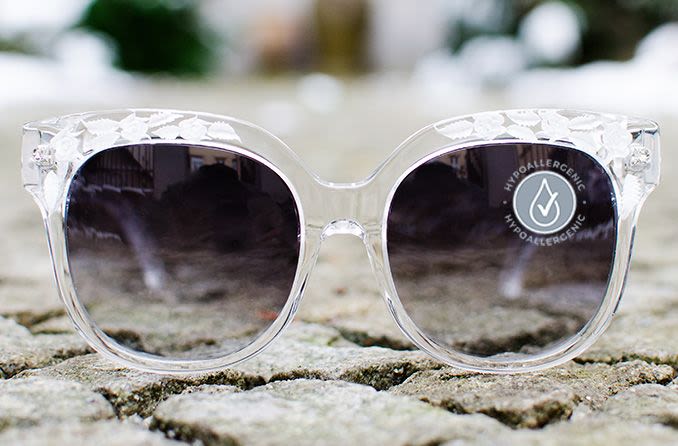What sunglass frame materials are hypoallergenic?

What is hypoallergenic eyewear?
You’ve probably heard the term “hypoallergenic” used most often in regard to pets that don’t produce dander (or so their breeders claim), but can glasses and sunglasses be hypoallergenic?
It turns out there’s growing demand for frames made with hypoallergenic materials — such as titanium and acetate — because people can have allergic reactions to eyewear.
SEE RELATED: Can you be allergic to your sunglasses?
If you’ve been feeling itchy or inflamed after wearing your sunglasses, you likely have wondered if you might be allergic to your shades. Is that even possible?
Just as you can be allergic to certain clothing materials, detergents and soaps, you can also be allergic to the material used to make your sunglasses frames.
Yes, you can buy sunglasses that won't cause allergies. For example, Maui Jim's Hookipa 907 prescription sunglasses have a featherweight grilamid frame that ensures allergy-free wear.
Shopping for sunglasses and unsure whether you might get buy them only to discover you are allergic to the frames? Read the product details and search for a mention that the frames won't cause allergic reactions.
YES, YOU CAN GET SUNGLASSES THAT WON'T CAUSE ALLERGIES: Shop for sunglasses with hypoallergenic frames at an optical store near you or an online eyewear retailer.
What are the symptoms of sunglasses frame allergies?
Whether you’re wearing prescription sunglasses or non-prescription (plano) sunglasses, the frames could cause an adverse reaction on your skin if you’re allergic to the material.
You’ll know if you’re allergic to the frame material if certain spots on your face experience skin irritation — also known as contact dermatitis — but the rest of your body does not. This way, you can eliminate other potential causes, like new laundry detergents, soaps and clothing.
Tell-tale spots for allergic reactions are the bridge of the nose, the tops of the ears and sometimes the browline — the places on your face where your frames rest.
If you find that the bridge of your nose is experiencing a reaction but your ears are not, you could be allergic to the material in the nose pads but not the frames.
Some symptoms of eye frame allergies include:
Redness
Itchiness
Soreness
Puffiness
Hives
Swelling
What sunglasses frame types are hypoallergenic?
If you experience contact dermatitis with metal frames, they may have nickel in them.
If you want to stick with the metal look, your best option is titanium. As long as it’s 100% pure titanium, it won’t include any nickel or other metals to which you might be sensitive. But keep in mind, that level of purity comes with a higher price tag.
Stainless steel, sterling silver and gold are other high-quality metals with a low incidence of allergic reactions, but they may not be as widely available as titanium.
A number of plastic hypoallergenic frame materials are also available, including:
Cellulose acetate propionate: Because this material is much more malleable than others, manufacturers will often shape it into fun, interesting designs. For those who value both fashion and comfort, propionate is the hypoallergenic material for you.
Polyamide: A strong material, polyamide can occur both naturally and synthetically. Examples of natural polyamides are wool and silk, but synthetic polyamide for eyewear is hard and runs no risk of causing skin irritation.
Nylon: This material is so durable, it’s especially popular among sports brands. Nylon frames are more flexible and more resistant to extreme temperatures (keeping them comfortable on your face even in harsh weather).
Optyl: This material is made with the intention of catering to skin-sensitive wearers; however, optyl is tougher to maneuver, making it difficult to adjust to the wearer’s head shape in some cases.
How do you treat skin irritation from glasses?
If you suspect an allergic reaction to your glasses, the first thing to do is talk to your doctor. You want to make sure you’ve correctly identified the issue, and get professional guidance in treatment.
Plus, you don’t want to spend money on new glasses or sunglasses if that’s not actually what’s bothering you.
Your doctor may suggest treating or relieving your skin irritation with over-the-counter hydrocortisone cream and/or taking antihistamines. Just be very careful applying anything topical near your eyes. Whatever you do, try not to scratch, no matter how itchy you are!
If your current glasses are the problem, you have a solution.
If you have to continue wearing your glasses until you get a new hypoallergenic pair, you can encase your frames in a material that doesn’t irritate your skin. Simply wrap gauze, duct tape, Band-Aids or anything else you have handy around the parts of your frames that make contact with your face.
COULD YOU BE ALLERGIC TO YOUR EYEWEAR? Find an eye doctor near you and schedule an appointment.
Page published on Thursday, February 13, 2020




